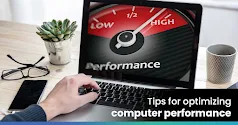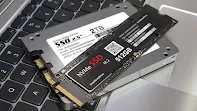Optimizing Computer Performance: Tips and Tools
It's crucial to regularly optimize your
computer for optimal performance, regardless of whether you use it for
business, play games, or personal use. Although ineffective and slow computers
can reduce productivity and irritate users, there are a few methods to optimize
your computer. In addition to other tips and tactics that help enhance your
PC's overall performance, we'll look at some of the upgrades you can make in
this post.
1. Invest in an SSD
Changing to an SSD (solid-state drive) is one of the biggest improvements you can make on your computer. SSDs can instantly enhance the performance of your PC because they are more dependable and faster than conventional hard drives. Upgrading to an SSD will result in substantially faster file transfers, program opening times, and operating system loading times. Additionally, an SSD helps speed up your computer's startup and shutdown times. Upon switching to an SSD, The overall performance and user experience of your PC will significantly improve. If you currently have an SSD, make sure to keep an eye on its condition to ensure that it keeps performing well. If you want even quicker performance, you might want to upgrade to an NVMe SSD.
2. Upgrade RAM
3. Delete files and programs that are superfluous
4. Maintain system updates
Optimizing PC performance can be achieved by updating your drivers and operating system on a regular basis. Updates for operating systems, like those from Apple and Microsoft, frequently contain new features, security improvements, and bug fixes that can boost performance and stability. Improved performance is provided by driver updates, which guarantee compatibility with the newest hardware and software. To prevent any slowdowns, you can plan routine checks and upgrades for when you're not using the computer. Make sure you frequently update your computer with any available updates, check for the newest drivers on the manufacturer's website, and install any updates that are available.
5. Set program limits when it first launches
Reducing the quantity of apps that launch automatically when your computer turns on can greatly improve performance. Certain programs might not need to be started right once, while others might be necessary. Your computer will start up faster and operate more responsively overall if you disable any pointless startup programs.6. Excessive rework
Overclocking might be a good alternative if you want to get more performance out of your computer. In order to gain faster performance, overclocking entails pushing specific hardware elements, such the CPU, past their factory-set speed limits. But it should only be carried out after thorough investigation and comprehension. The performance improvements made possible by the aforementioned advice ought to be adequate for the majority of users to noticeably improve PC performance.
These are some of the best adjustments you can make to maximize performance on your PC. Two significant hardware upgrades that can improve overall PC speed and responsiveness are switching to an SSD and adding more RAM. Furthermore, adhering to further recommendations, such eliminating superfluous software, will enhance a PC's performance and efficiency. Making the time and effort to optimize your PC will pay off in the long run by keeping it operating at optimal efficiency.
__________________________________________________________________________________________________________________________________________________________________________________________________
Improving the performance of your computer is essential to guaranteeing a seamless and effective experience, be it for daily chores, work, or gaming. Here are some pointers and resources to help you maximize the performance and speed of your computer.
1. Regular Maintenance
- Disk Cleanup: To clear up space, use built-in utilities like Windows' Disk Cleanup or third-party programs like Cleaner.
- Defragmentation: To restructure fragmented data, periodically defragment your HDDs. SSDs benefit from sporadic TRIM instructions but don't require defragmentation.
2. Oversee Initial Programs
- Your computer may become slower at startup if it has too many open programs. For Windows and Mac, use the Task Manager and Activity Monitor, respectively, to manage and disable unused startup processes.
3. Install the most recent drivers and software
- Make that the software, drivers, and operating system on your computer are current. Security patches and performance enhancements are frequently included in updates.
4. Adjust Power Parameters
- For improved performance, change the power settings. Use the "High Performance" power plan for Windows. To adjust performance on Macs, navigate to the "Energy Saver" options.
5. Hardware Revisions
- RAM Upgrade: Increasing the amount of RAM on a computer can greatly enhance its responsiveness and ability to multitask.
- Upgrading to a faster SSD or replacing an HDD with an SSD can significantly shorten startup times and increase the speed at which data is accessed.
- Graphics Card (GPU): Investing in a better GPU can significantly increase performance when playing games or doing other graphic-intensive chores.
6. Use Performance-Boosting Software
- Optimizers to Boost Performance: Comprehensive system optimization is provided by programs like Advanced System Care and Cleaner, which also remove unwanted files and clear the registry.
- Software for Overclocking: For enhanced performance, skilled users can overclock their CPU or GPU with programs like MSI Afterburner, although there are risks involved, such as overheating.
7. Keep an eye on system performance
- To find bottlenecks, periodically assess system performance using programs like Resource Monitor, Windows Task Manager, or third-party software like HW Monitor.
8. Remove Superfluous Software
- Programs that are not in use can be removed to enhance performance, clear up clutter, and free up system resources.
9. Turn off the visual effects
- Particularly on older computers, you can free up resources by turning off or minimizing visual features in your operating system, such as animations and shadows.
10. Air Conditioning and Opening
- Make sure there is enough ventilation on your PC. Dust off fans, and think about adding more cooling options, such as cooling pads or external fans, to avoid overheating, which can stifle performance.
CONCLUSON
You can maintain the smooth and effective operation of your computer by using the appropriate tools and adhering to these suggestions. Maintaining optimal performance requires regular hardware updates, routine maintenance, and appropriate software management.
techtingal.blogspot.com How to Improve Your Computers Security.html
techtingal.blogspot.com










.jpeg)



Comments
Post a Comment